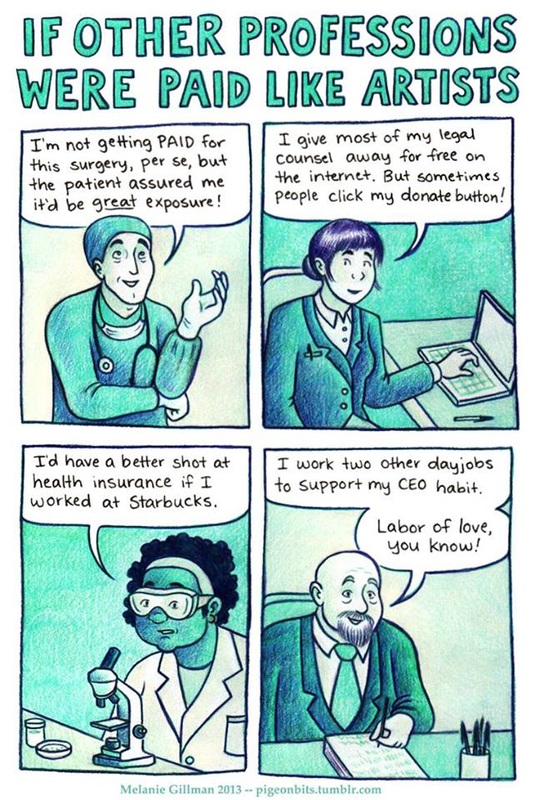|
Ever been asked to work for free? Or in exchange for 'exposure' and 'opportunities'? A growing number of musicians are learning just how important it is to say "No" to promises of exposure. But, do you have to be willing to lower your standards in order to have even a sliver of a chance at 'making it'? Well, a lot of people seem to think so, especially bar owners & establishments that want to maximize profits by not paying their entertainers. But lets look at the reality. Yes the music business is competitive. It's also highly enjoyable. Being a musician is a vocation, but just because a musician loves what they do does it mean they deserve to suffer financially because they are compensated by the fact that they enjoy their work? The reality is that where people are desperate and willing to accept less money, less respect, and being used for profit, these tendencies will thrive, taking advantage of good musicians who don't know how to promote themselves, and who are hoping that headlining to 2000 people or boosting a Facebook post here and there is going to lead to a long term, stable successful career in music. Essentially, this blog post is a recommendation and encouragement to musicians; not to accept gigs that are unfairly paid or not paid at all! "You can say “no” to a gig. It’s always worth trying to negotiate, but if there’s no flexibility on the promoter’s behalf, and the deal isn’t right for you, don’t do it – you’re not losing anything, but you are applying quality control." – MU Fair play guide Furthermore, the MU points out that while the caterers, promoters, poster designers, agents and managers of events are paid, musician fees are somehow treated as an exception and thought of as optional. Untested Waters
One professional musician from Bristol says "So far, professional musicians have never consistently said "no" to test whether establishments would settle for amateurs & semi professionals at a lower price point. If 100% of the professional musicians in Bristol said no to low pay, would the audience notice? Would the establishments suffer? Would the power of no make a change in industry trends?" A Positive Case "After sending out a rather wordy email in response to being asked to play in exchange for donations for the audience (which I was assured would be plentiful)" - A solo musician from Gloucestershire says -"I went to the venue itself to see about putting on my own, ticketed and paid, event there. As it turns out, the agent who had tried to book me before had passed on my email to them so when I spoke to their office they recognized me! And, do you know, they recognized me as a professional with high standards who respects her music. They likewise respected me as an artist and offered me several highly acceptable opportunities to play at their various venues to a much larger audience and for much better pay. #powerofno!" Work Not Play - http://www.worknotplay.co.uk/ The musicians union (MU) created a campaign back in 2012: #WorkNotPlay - Fair pay for musicians. "...we’re doing our best to educate all involved: artists, in order that they can find the best work available; employers, who may not understand the implications of exploiting musicians, and the public, who play a crucial role by attending gigs and buying tickets." - MU #WorkNotPlay They have written a Fair Play Guide for musicians, venues & promoters to follow, and, by means of their #WorkNotPlay campaign, encourage musicians to tell their stories and to re-evaluate whether they need to settle for less pay. What About Charity Gigs? "It is extremely unfair to put professional musicians into a situation where they are emotionally blackmailed into working for no fee and are asked to give their services to a good cause.This is particularly unjust when others associated with the event, such as venue staff, lawyers and caterers, are being paid." - MU #WorkNotPlay FAQ The most powerful thing we can do is to say "No", and to keep telling the industry that if they want professional musicians to come and put on a good show, they can expect to pay them, and can expect to profit from their presence at the establishment. It's one thing if you have a job and you do music as a hobby to enjoy playing for an audience in exchange for a pint or some pocket money, it's another thing for professional musicians to lower their standards, drive the market down, and accept less than their music is worth because they don't feel like they have a choice. Have another choice, change they way you see your career in music, make it work for you, don't sell out! Share you stories, comments and opinions with #PowerOfNo See the Work Not Play facebook group: https://www.facebook.com/WorkNotPlay
0 Comments
Leave a Reply. |
Follow SaskiaArchives
December 2022
|
|
For questions, comments or queries: Contact/Book Saskia
|


 RSS Feed
RSS Feed